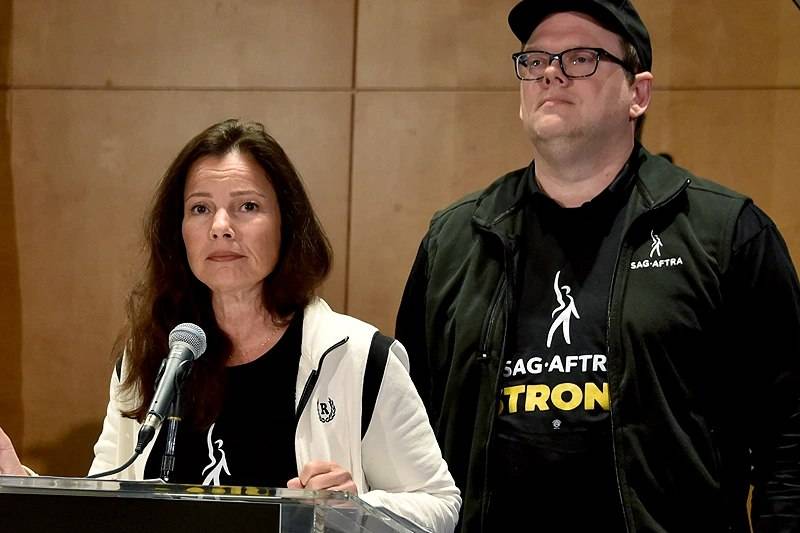National Executive Director and Chief Negotiator Duncan Crabtree-Ireland looks on as SAG-AFTRA President US actress Fran Drescher (L) speaks during a press conference at the labor union’s headquarters in Los Angeles, California, on July 13, 2023. (Photo by Getty Images)
Thousands of Hollywood actors are protesting after their labor union and a trade organization representing the industry’s top film and television companies failed to reach an agreement on a new contract.
The Screen Actors Guild-American Federation of Television and Radio Artists, referred to as SAG-AFTRA, voted overwhelmingly to strike on Thursday morning, the guild’s top negotiator declared at an afternoon press conference.
Picket lines will begin to develop on Friday, according to SAG-AFTRA’s Duncan Crabtree-Ireland.
“What happens here is important because what’s happening to us is happening across all fields of labor, by means of when employers make Wall Street and greed their priority and they forget about the essential contributors that make the machine run,” SAG-AFTRA president Fran Drescher said.
Members of the guild, alarmed by the economics of the streaming era and the proliferation of shifting digital technologies, want increased base pay and restrictions against the use of artificial intelligence (AI), among other things. Writers in Hollywood are already on strike over related issues.
SAG-AFTRA stated in a press release issued on Thursday that after more than four weeks of negotiating, the trade group who represents major corporations like Disney, Netflix, and Warner Bros. Discovery “remains unwilling to offer a fair deal on the key issues that are essential” to members.
In that statement, Drescher, who starred in the 1990s series The Nanny, asserted that her guild “negotiated in good faith,” but “the AMPTP’s responses to the union’s most important proposals have been insulting and disrespectful of our massive contributions to this industry.”
The studios’ representatives said they were “deeply disappointed” by the failed attempt to come to an agreement.
“This is the Union’s choice, not ours. In doing so, it has dismissed our offer of historic pay and residual increases, substantially higher caps on pension and health contributions, audition protections, shortened series option periods, a groundbreaking AI proposal that protects actors’ digital likenesses, and more,” the Alliance of Motion Picture and Television Producers said in a statement.
“Rather than continuing to negotiate, SAG-AFTRA has put us on a course that will deepen the financial hardship for thousands who depend on the industry for their livelihoods,” they added.
Film and television projects will be exempt from the strike, and SAG-AFTRA members who work in the news industry, such as broadcast hosts and announcers, will similarly not participate.
The news comes more than two months after the Writers Guild of America, a union that represents screenwriters in film and television, went on strike as part of its own dispute with the Alliance of Motion Picture and Television Producers.
The writers’ strike halted most television production, postponed the filming of many high-profile films, and forced late-night talk shows to solely air reruns.
SAG-AFTRA members overwhelmingly approved the strike on June 5th. 97.91% of the almost 65,000 members who voted approved it. Two days later, the guild began negotiating with the big studios and streaming platforms.
The union’s current contract with the major studios was set to expire at 11:59 p.m. PT on June 30th, however, both parties agreed to continue talks and extended the deadline to midnight on July 12th.
SAG-AFTRA members have contended that the shifting economics of streaming entertainment have undercut actors and creatives and that new technology is threatening their careers.
The guild is requesting a raise in basic pay for performers, which union leaders claim has decreased as streaming-first studios shift away from handing out residuals to talent.
The actors’ union is also concerned about the threat presented by AI applications, such as tools that may create artificial substitutes for known stars, and the expense of “self-taped auditions,” which are videos that were previously paid for by casting departments and production offices.
Some in the entertainment industry were concerned in recent weeks that all three main Hollywood organizations—SAG-AFTRA, WGA, and the Directors Guild of America, or DGA—might strike at the same time.
However, the Directors Guild declared in early June that it had negotiated a “truly historic” provisional deal with the studios.




No comments yet
Be the first to share your thoughts!